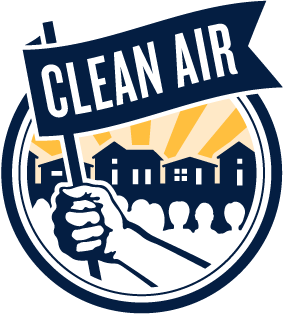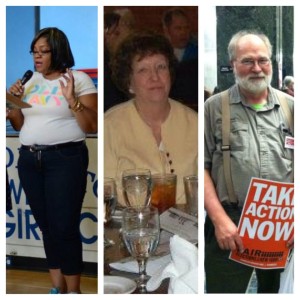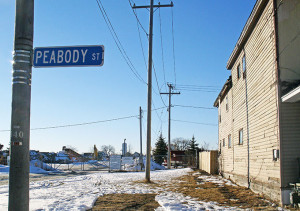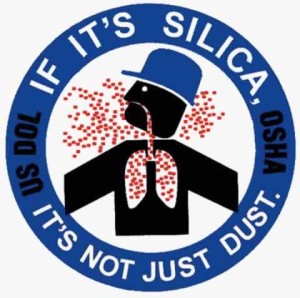Gira Tóxica 14 de Mayo
Toxic Tours son recorridos guiados en camioneta a través de Tonawanda y el lado oeste de Buffalo que se detendrán en algunos de los muchos puntos de referencia importantes de contaminación y justicia ambiental en nuestra región..
- Únase a los líderes de base que luchan contra los contaminadores corporativos y las agencias gubernamentales negligentes en un recorrido por sus vecindarios..
- Ver Coca-Cola Tonawanda; el tercer puerto terrestre más grande de los EE. UU.; terminales petroleras; y otras plantas que son algunos de los mayores contaminantes del condado de Erie.
- Aprenda lo que realmente está en el aire en Buffalo y lo que nuestro movimiento de base está haciendo para contraatacar..
Miércoles, 14 de mayo 2014 8SOY
Conozca y estacione en el Boys and Girls Club
en 54 Avenida Riverdale. Buffalo NY 14207
Estacionamiento en la parte trasera del edificio en Edgar Ave..
RSVP a Rachel en 852-3813 o rachel@cacwny.org
El espacio es limitado, así que reserve su asiento hoy!
Felicitaciones a nuestros ganadores del premio anual!
Liderazgo en la lucha por la salud y la justicia ambiental en el Oeste de Nueva York.. Esta persona ha demostrado un profundo compromiso con la acción en nombre de los residentes del oeste de Nueva York y ha contribuido al desarrollo de poderosas estrategias para mejorar la salud de la comunidad y el medio ambiente.. Felicitaciones al ganador de este año, Ron Malec.!
Hotel La Fayette, la sala del invernadero
391 Washington St.. Búfalo, Nueva York
puertas en 6:00 * La cena se sirvió un 6:30 * Barra de efectivoConfirma tu asistencia antes de mayo 5, 2014:
341 Delaware Avenue
Búfalo, Nueva York 14202
Tour de Séneca Babcock 13 de mayo
Desde que Battaglia Demolition comenzó a operar un poco más 10 hace años, los residentes de Peabody St. y el vecindario circundante se han quejado ante el estado y la ciudad de Buffalo con respecto al polvo y el hollín provenientes de la instalación.; Ruido fuerte que comienza temprano en la mañana de las excavadoras y la trituradora de concreto.; y tráfico masivo de camiones que se encamina por pequeñas calles residenciales.
“No puedo abrir mis ventanas debido a todo el polvo de la roca que aplasta. A mis hijos les resulta difícil jugar afuera porque hay muchos camiones arriba y abajo de la calle.. A mis hijos siempre les sangra la nariz durante todo el día”. Queja del residente de Peabody al DEC en 2013
Clean Air se unió a la lucha de una década de los residentes a principios de este año, trabajando en estrecha colaboración con los propietarios de viviendas en la comunidad densamente poblada junto a la ubicación de Battaglia en Seneca Babcock.
El 13 de mayo, los residentes realizarán un recorrido a pie por su vecindario y explicarán cómo el legado de la industria ha impactado sus vidas.. Los residentes describirán su lucha de diez años contra el aplastamiento del hormigón., Ganancias y pérdidas y cómo puedes involucrarte..
Para obtener más información sobre el reciclaje de Battaglia, ver el artículo reciente en el Puesto de investigación
Coca-Cola Tonawanda sentenciada
Después de muchos meses de anticipación y muchos años de organización comunitaria y arduo trabajo, El juez William Skretny condenó en marzo a Tonawanda Coke y a su responsable de control medioambiental 19 en el Tribunal Federal en el centro de Buffalo. Tonawanda Coke fue encontrado culpable en marzo 2013 de ruptura 14 leyes federales bajo la Ley de Aire Limpio y la Ley de Conservación y Recuperación de Recursos. Marcos Kamholz, el gerente de control ambiental, fue declarado culpable de los mismos cargos y un cargo adicional de obstrucción de la justicia.
La decisión del juez Skretny incluyó:
* $12.5 Millones en multas por violaciones criminales de la Ley de Aire Limpio y la Ley de Conservación y Recuperación de Recursos irán al Tesoro de los EE. UU.
* 5 años de prueba para la empresa
* Pagar $11 millones a la Universidad de Buffalo por un 10 año de estudio de salud & terminado $700,000 a Recursos Comunitarios de Ciencia Ciudadana para realizar muestreos de suelos
* 1 año y 1 Un día de prisión para Mark Kamholz, más que $20,000 multa y una libertad bajo supervisión después de haber cumplido el término
“Si bien este fue un evento histórico y una victoria importante para la comunidad, Estamos de acuerdo con el gobierno en que las multas y las penas de cárcel deberían haber sido más altas.,” dijo Erin Heaney, director ejecutivo de Aire Limpio. “Continuaremos luchando fuera de los tribunales para implementar los proyectos que la comunidad identificó.,” refiriéndose a los proyectos identificados en el año pasado Participatory Budgeting proyecto organizado por Clean Air.
La sentencia se produjo pocas semanas después de un explosión en Tonawanda Coke resonó en kilómetros a la redonda en enero 31. Si bien los representantes de Tonawanda Coke inicialmente insistieron en que la explosión fue menor, no hubo heridos, y solo se libero vapor de agua, La historia cambió a medida que los miembros de la comunidad se preocuparon más y Clean Air pidió una investigación completa sobre la explosión..
Finalmente se reveló que dos empleados resultaron heridos en la explosión, sufriendo por inhalación de polvo, quemaduras de primer grado, y dolores en las articulaciones. También se descubrió que la explosión fue causada por la ruptura de un equipo dentro de un horno de coque., que liberó y encendió el gas del horno de coque, provocando las grandes columnas de humo vistas desde kilómetros de distancia. En febrero 26, Tonawanda Coke recibió dos avisos de infracción del Departamento de Conservación Ambiental por no informar las emisiones y por no mantener el equipo que causó la explosión..
ÚNASE A NOSOTROS PARA NUESTRO INFORME SOBRE LA SENTENCIA DE TONAWANDA COKE
Únase a nosotros el 15 de abril en 6:30pm en el Centro Comunitario Sheridan Parkside para informar sobre nuestra campaña sobre Tonawanda Coke. Traiga un artículo que represente por qué está en la lucha para llevar salud y justicia al Oeste de Nueva York..
Para obtener más información, comuníquese con Rebecca Newberry en 852-3813 o rebecca@cacwny.org~~V.
Concluyen las Asambleas de Transición Justa + Próximos pasos
Tras la publicación del reciente informe del Instituto de Economía Energética y Análisis Financiero (IEEFA) sobre el futuro de la planta de carbón Huntley en la ciudad de Tonawanda, Clean Air realizó una serie de asambleas comunitarias en la ciudad y pueblo de Tonawanda, Grand Island, y Riverside para visualizar una transición “justa” fuera de la planta.
La idea de una transición “justa” fue promovida por primera vez por Tony Mazzocchi., el fundador del movimiento de seguridad y salud en el lugar de trabajo, y sugiere que cuando las plantas peligrosas para nuestra salud y el medio ambiente se retiren, Se deben invertir recursos para garantizar que los hombres y mujeres trabajadores y las comunidades locales no sólo puedan sobrevivir., pero prosperar. Y entonces, en estas Asambleas de Transición Justa a lo largo del mes de marzo, cerca de 100 residentes impactados, trabajadores, y activistas del cambio climático se reunieron visualizar un futuro resiliente para nuestra región si la planta de carbón NRG Huntley se retirara.
Se pidió a los participantes que consideraran varias preguntas: ¿a quién debemos cuidar?, ¿Cómo podemos cuidarlos?, y en un mundo perfecto, ¿Qué haríamos con la tierra en la que actualmente se encuentra Huntley?. La preocupación número uno en las cuatro asambleas fue el impacto en los trabajadores de Huntley y sus familias.. Algunas de las ideas generadas sobre cómo cuidarlos incluyeron el reciclaje laboral., paquetes de indemnización, y transferencias laterales. Otras preocupaciones incluyeron el impacto en el distrito escolar y en los servicios de la ciudad y el condado.. Los participantes sostuvieron que para asegurar el éxito de la región, la carga no podía recaer en los contribuyentes de Tonawanda y el condado de Erie. Las posibles fuentes de ingresos incluyeron ayuda del gobierno federal o estatal., financiación de otras fuentes como NYPA o RGGI, y asegurándose de que NRG (La empresa matriz de Huntley) fue responsabilizado en el proceso. Cuando se le pidió que visualizara un futuro ilimitado para el espacio de Huntley, Los participantes generaron cientos de ideas para el desarrollo económico., energía renovable, creación de empleo y reconexión con nuestra costa: todo, desde convertir Huntley en una reserva natural hasta la creación de un parque de diversiones a partir de la infraestructura existente de Huntley..
El siguiente paso es nuestra reunión de delegados de Transición Justa que será mañana., Jueves, Marzo 27ª, a las 6 p.m. en el American Legion-Brounshidle Post #2!
Una cosa que quedó clara después de las asambleas fue que aún quedaban muchas preguntas sin respuesta.. ¿Qué tan contaminado está el sitio?? Si la planta cierra, ¿Quién es responsable del espacio y la limpieza?? ¿Cuál es la respuesta de NRG al informe?? ¿Existen otras opciones además de cerrar la planta??
Estaba claro que la comunidad quería respuestas y necesitábamos expertos para responderlas.. Y así como seguimiento de estas asambleas, estaremos celebrando un Conferencia de Transición Justa el sábado, 7 de junio, en el Estado de Nueva York United Teachers (NYSUT) Oficina de WNY ubicada en 270 Carretera Essjay, Williamsville Nueva York 14221. Los paneles y talleres estarán dirigidos por líderes de comunidades que enfrentan desafíos similares., Los líderes laborales, visionarios de la nueva economía, expertos en reurbanización de terrenos abandonados, y otros líderes de la comunidad local.
Por favor ayúdenos a hacer realidad esta conferencia y conviértase en un miembro sustentador de la Coalición para el Aire Limpio para ayudarnos a seguir adelante. Con su generoso regalo de membresía de $25, $35 o $60 Podemos seguir siendo una fuerza por la justicia ambiental en nuestra región..
– Melanie Prasad
Becario climático de NOI
Gira Tóxica 9 de Abril!
Únase a nosotros para un Toxic Tour el 9 de abril!
Toxic Tours son recorridos guiados en camioneta a través de Tonawanda y el lado oeste de Buffalo que se detendrán en algunos de los muchos puntos de referencia importantes de contaminación y justicia ambiental en nuestra región..
- Únase a los líderes de base que luchan contra los contaminadores corporativos y las agencias gubernamentales negligentes en un recorrido por sus vecindarios..
- Ver Coca-Cola Tonawanda; el tercer puerto terrestre más grande de los EE. UU.; terminales petroleras; y otras plantas que son algunos de los mayores contaminantes del condado de Erie.
- Aprenda lo que realmente está en el aire en Buffalo y lo que nuestro movimiento de base está haciendo para contraatacar..
Miércoles, 9 de abril 2014 8SOY
Conozca y estacione en el Boys and Girls Club en 54 Avenida Riverdale. Buffalo NY 14207
Estacionamiento en la parte trasera del edificio en Edgar Ave..
RSVP a Rachel en 852-3813 o rachel@cacwny.org
El espacio es limitado, así que reserve su asiento hoy!
Únete a la lucha en Peabody Street
Cientos de camiones retumbando sobre un polvoriento camino de tierra arrojando escapes de diesel cancerígenos. Nubes de polvo de la trituración de hormigón. El vertido de materiales de demolición desde antes del amanecer hasta después del atardecer.
“No puedo abrir mis ventanas debido a todo el polvo de la roca que aplasta. Es difícil para mis hijos jugar afuera porque hay muchos camiones arriba y abajo de la calle. A mis hijos siempre les sangra la nariz todo el día”.
Esto es lo que viven los residentes de Peabody Street en Seneca Babcock. Nuestros miembros más nuevos Jack, Diana, y sus vecinos se están organizando para mejorar la calidad de vida en su barrio. este febrero, la junta directiva de Clean Air votó para unir sus esfuerzos.
batalla inc. ha operado en el barrio por menos de diez años. En ese momento, la empresa ha sido citada en numerosas ocasiones por el Departamento de Conservación Ambiental por violación de su permiso. El DEC también encontró rastros de polvo de sílice en los alféizares de las ventanas de los residentes.. La sílice cristalina ha sido clasificada como carcinógeno pulmonar humano, su polvo puede causar silicosis, que puede ser incapacitante o, en algunos casos,, fatal. Cuando el polvo ingresa a los pulmones, se forma tejido cicatricial que reduce la capacidad de los pulmones para absorber oxígeno..
Clean Air está trabajando para apoyar la organización de los residentes para reducir su exposición al polvo de sílice y recuperar su vecindario.. necesitamos levantar $5,000 esta primavera para apoyar este trabajo. Agradecemos sus contribuciones anteriores y pensamos que estaría interesado en apoyar a este vecindario.. nos puedes ayudar haciendo una aportacion? Publicaremos agradecimientos y actualizaciones a lo largo de la semana en nuestras redes sociales para mantenerlo actualizado sobre nuestro progreso.!
Fiscal de Distrito de EE. UU. en el caso penal de Coca-Cola Tonawanda se reunirá con el público
Fiscal de Distrito de EE. UU. en el caso penal de Coca-Cola Tonawanda se reunirá con el público
Clean Air continúa sus esfuerzos para mantener las posibles multas a nivel local
Aarón J.. mango, Asistente EE.UU.. El abogado del caso histórico contra Tonawanda Coke Corporation proporcionará al público una actualización de la sentencia. Se anima a asistir a los residentes y trabajadores que hayan sido o potencialmente hayan sido afectados por la empresa.. Esta es una reunión importante para continuar la lucha para mantener las posibles multas locales y controladas por las comunidades afectadas..
Hace casi un año, Tonawanda Coke Corporation fue declarada culpable de violar la Ley de Aire Limpio y la Ley de Recuperación y Conversación de Recursos. Este veredicto histórico es sólo la segunda vez en la historia de Estados Unidos que una empresa ha sido acusada en virtud de la Ley de Aire Limpio., y sentará un precedente para casos futuros. La empresa podría hacer frente a $200 millones de dólares en multas.
El verano pasado, Aire Limpio lideró una Campaña para mantener las posibles multas penales locales y utilizadas para financiar proyectos controlados por la comunidad en los vecindarios más afectados. Casi 600 Los residentes votan sobre cómo creen que se deben utilizar los fondos.. Este trabajo dio como resultado que el Departamento de Justicia recomendara $12,794,182 ir hacia proyectos de servicio comunitario. La decisión final recae en el Juez..
La sentencia tanto para Tonawanda Coke Corporation como para Mark Kamholz está prevista para marzo 19, 2014 en 10:00 AM antes de EE.UU.. El juez jefe del tribunal de distrito, William Skretny, en el tribunal federal de 2 Niagara Square (9º piso), Búfalo, Nueva York
CUANDO: lunes, Marzo 10ª de 6 a 8 p.m.
DÓNDE: Sala de bomberos de River Road, 39 Avenida Kaufman. Tonawanda 14150
Clean Air se une a los residentes de Peabody en la lucha contra las trituradoras de hormigón!
Este miércoles, la Junta Directiva de Clean Air vota por unanimidad para unirse a los residentes de Peabody St.. en el barrio Seneca Babcock para enfrentarse a Battaglia Inc..
batalla inc. está ubicado en 1037 Calle Séneca. Búfalo, Nueva York. La línea de propiedad de la compañía choca con la propiedad de propietarios e inquilinos en Peabody St., una comunidad densamente poblada en South Buffalo. La empresa es un sitio de transferencia de demolición., que almacena temporalmente los escombros de la demolición de viviendas. Battaglia también se dedica a la trituración de hormigón in situ. Debido a las actividades de la empresa., Hay una gran cantidad de camiones entrando y saliendo de las instalaciones., carga y descarga de basura y escombros.
La empresa ha estado en funcionamiento por menos de 10 años. En este período, Battaglia ha sido citado en numerosas ocasiones por el Departamento de Conservación Ambiental por violación de sus 360 Permiso de Transferencia de Residuos.
Clean Air se dio cuenta del problema después de que nuestra oficina recibiera numerosas quejas de residentes que viven cerca de la empresa.. Ejemplos de quejas que hemos recibido son los siguientes:
“Los niños siempre tienen dolores de cabeza por todo el polvo de la piedra, fotos que caen de la pared desde la casa que tiembla debido a todos los camiones que suben y bajan por la calle”.
“No puedo abrir mis ventanas debido a todo el polvo de la roca que aplasta. A mis hijos les resulta difícil jugar afuera porque hay muchos camiones arriba y abajo de la calle.… A mis hijos siempre les sangra la nariz y lo único que escucho durante todo el día es el pitido de los camiones”.
Estamos entusiasmados de trabajar con el dedicado y valiente Peabody St.. residentes. Estén atentos para ver el progreso de esta campaña.…
Únase a nosotros en una Asamblea de Transición Justa
Huntley, ubicado en la ciudad de Tonawanda, es la última central eléctrica de carbón del condado de Erie. Un reciente reporte por el Instituto de Economía Energética y Análisis Financiero afirmó que Huntley es “experimentando ganancias promedio anuales antes de impuestos de un valor negativo $1 millones y no parece ser financieramente viable”. El informe estima que tan recientemente como 2005, la planta estaba haciendo $110 millones al año y que la planta perdió $1 millones por año entre 2009 y 2012. El informe continúa haciendo un llamado al liderazgo comunitario y corporativo..
Según nota de prensa del IEEFA, ex Primer Adjunto Contralor del Estado de Nueva York Tom Sanzillo, coautor del informe y director de finanzas, IEEFA, dijo: “La región puede afrontar los desafíos que plantea la planta de Huntley si la planificación comienza ahora. Estimamos que hay menos de 70 Empleados que pueden verse afectados por la jubilación de una planta de carbón.. El objetivo de nuestro plan es brindar a cada empleado oportunidades para una vida estable, ingresos a largo plazo. La débil situación financiera de la planta de Huntley crea un riesgo de ingresos para la ciudad de Tonawanda, su departamento de carreteras, El condado de Erie y el distrito escolar de Ken-Ton. Con diferencia, el pago de NRG más grande e importante es el del distrito escolar de Ken-Ton.. A medida que la financiación de la planta se deteriora, los pagos de impuestos al distrito serán más pequeños. El presupuesto real para 2012 porque el distrito era $135 y abogar ante los funcionarios públicos sobre la contaminación y las molestias de la demolición de Battaglia. Los pagos de la planta de Huntley constituyen 5.9 por ciento de los gastos reales del distrito para 2012. Con una planificación adecuada, la pérdida de ingresos de la planta de Huntley no tiene por qué resultar en una sacudida repentina en el presupuesto del distrito escolar”.
Debemos asegurarnos de que si la planta se retira, que los trabajadores de la planta y los residentes que viven cerca de la planta estén protegidos. Debemos asegurarnos de que se aseguren nuevos ingresos para nuestras escuelas y gobiernos locales., y para una limpieza de la propiedad frente al mar.
Únase a nosotros para una Asamblea de Transición Justa donde:
- Comparta el informe financiero sobre Huntley
- Piensen en lo que los residentes, trabajadores, y los gobiernos locales necesitarán en el futuro
- Identificar las prioridades de la comunidad
SÁBADO, 1 de marzo a las 15 h.: Club de niños y niñas en 54 Riverdale Rd en la ciudad de Tonawanda
LUNES, 3 de marzo, 6pm: Biblioteca conmemorativa de Grand Island 1715 Calle Bedell. Grand Island
JUEVES, 6 de marzo a las 18 h.: Centro Comunitario del Noroeste en 155 Lawn Ave en Búfalo
JUEVES, 13 de marzo a las 6 p.m. Ayuntamiento de Tonawanda, 200 Calle Niágara. en la ciudad de Tonawanda




